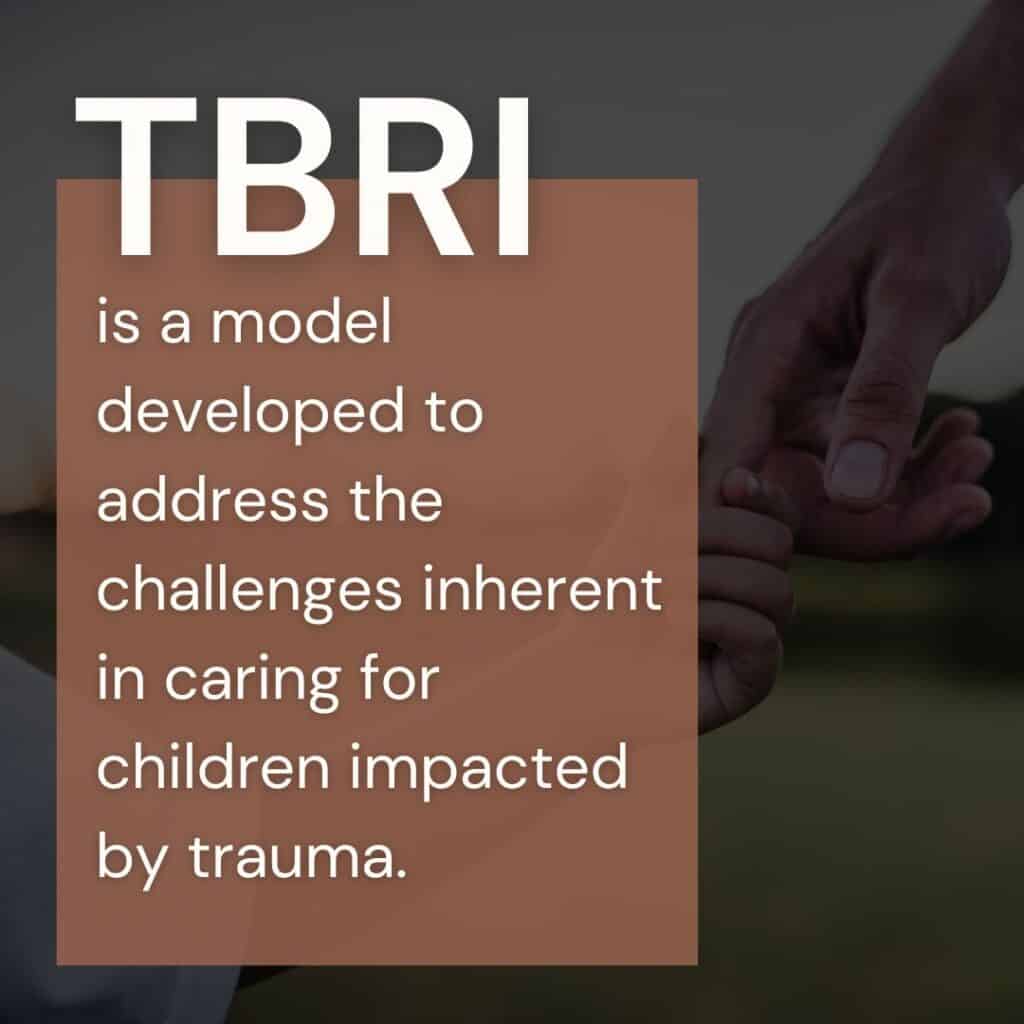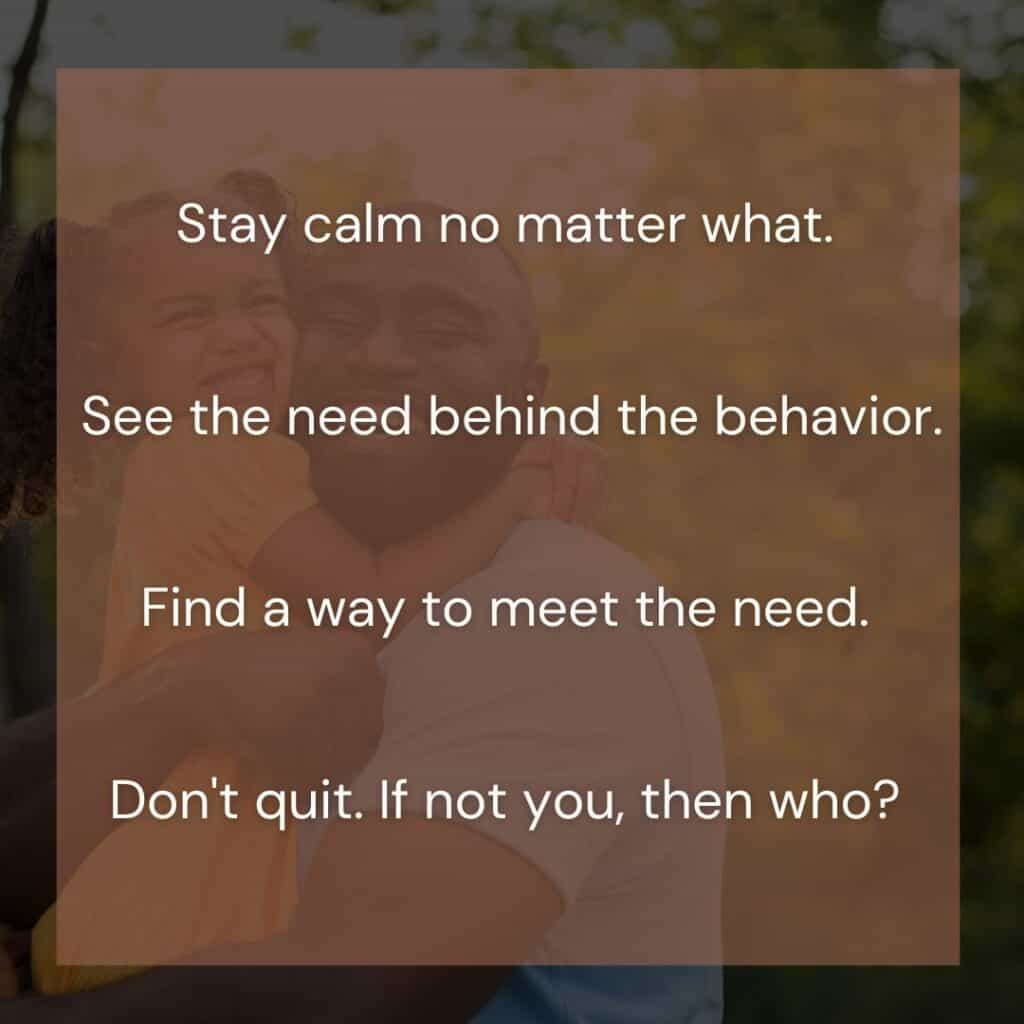
Trust-Based Relational Intervention®, more commonly known as TBRI®, is a model developed to address the challenges inherent in caring for children impacted by trauma, often including those impacted by adoption and/or foster care. The creators of TBRI, Drs. Karyn Purvis and David Cross, aptly share that trauma impacts the “5 B’s: Brain, Body, Biology, Beliefs, and Behavior.” Since their primary caregiver relationship is disrupted, these children often have a difficult time attaching to and trusting their new caregivers. These attachment injuries can lead to some challenging behaviors in seemingly typical situations. Children impacted by trauma are constantly scanning their environment for threats, which often leads to fear-based survival behaviors.
TBRI not only provides knowledge about how trauma impacts the brain, but it also provides strategies to encourage felt safety, connection, and regulation for our kids. To summarize, Dr. Cross formed the adage:
Stay calm no matter what.
See the need behind the behavior.
Find a way to meet the need.
Don’t quit. If not you, then who?
Stay Calm No Matter What
I want to share examples from our daily life to give you an idea of how TBRI has impacted my parenting style. My wife of sixteen years and I have two children welcomed home through adoption. TBRI makes it abundantly clear that my kids are not the only ones who get dysregulated, or “flip their lids,” as we say. I get dysregulated too.
I’m more self-aware of what pushes my buttons, like when I’ve asked my kids to put their shoes on for the twelfth time as we ready ourselves to leave for school. My neck gets hot as I start to tense up. At that point, I have two choices at that point. I can yell, “LET’S GO!!!!” or briefly say, “Guys, I’m getting hot and frustrated. I feel like I’m going to yell, and I don’t want to do that.” Then, I can take a couple of deep breaths and slow down my heart rate. I can remind myself of the end goal— to set my kids up for a good day at school. Then I can continue to interact with my kids calmly but urgently.
It’s still important that we get to school on time, but it creates more problems than it solves if I blow up at my kids. Remember, I mentioned above that our kids constantly scan their environment for threats and act accordingly. I don’t want to be a threat to my kids; I want to be their ally, especially in the tough moments.

See the Need Behind the Behavior
One of the most oft-quoted aspects of TBRI is to “see the need behind the behavior.” This thought alone was a paradigm shift for me, and it helped me to see that my kids’ behaviors are not always willful disobedience. Often, there is a genuine need they are trying to express whether or not they get the behavior right. It’s our job to both identify the need in our minds and help our kids learn how to express those needs with words rather than behaviors.
One example that sticks out in my is mind is food hoarding. Before I understood the need behind food hoarding—food security—I exasperated one of my kids over this scenario. Ashamedly, I wasn’t looking for the “why” behind the behavior. I just wanted the behavior to stop. What happened instead? My child would shut down, not talk to me, and feel shame. My child was looking for safety, and I unintentionally shattered it.
It’s been a journey to change how I approach unique behaviors like food hoarding. However, now I approach those situations as an advocate rather than an interrogator. I don’t have to be personally offended! As my children see that I’m rooting for them and am truly seeking to understand and problem-solve together, they’re more willing to understand their need for themselves and appropriate ways to meet that need.
Find a Way to Meet the Need
I’m not a creative person by nature, but when it comes to my kids, I’m willing to do whatever is necessary, no matter how unconventional. One of my kids has difficulty sitting still for long periods of time. So guess how challenging Sunday mornings at 10:30 a.m. can be? We’ve discovered that if one of our children has several minutes of physical activity before our church service, their ability to sit through the service is vastly improved.
Typically, our kids play in the gym between Sunday School and the service, naturally meeting that need. However, one week, Sunday School was canceled. We arrived just a few minutes before service began and found our seats in the sanctuary. I saw that my child was antsy, on edge, and not set up well to sit through the service. The service was starting, and we should have been sitting down. But I knew we had to meet this need for my child to succeed so the rest of us could focus during the service. So we went to the gym together. I set a five-minute timer, and we played an epic game of dodgeball. When the timer went off, we got a drink of water and returned to the service.
The old me would have felt like I didn’t have permission to do that or that it was somehow offensive to “play” during church. However, now I realize that in those moments, I am meeting my children where they are so they’re in a better position to engage in sit-still activities like church services.
Don’t Quit. If Not You, Then Who?

The benefits of being a connected and engaged dad are immense, but it takes a lot of effort. Managing my own expectations of where my kids should be by now (and where I should be) and admitting when I need a break is crucial for taking the long view in my parenting. I know that truth in my heart, but it’s hard to ask for help because I believe it makes me look weak.
Even so, I need to be honest with my wife when I need to take a breather. I also need not to be offended when I’m getting heated up and she chimes in to keep a calm and engaged tone with the kids. Being honest with a few guys in my life about parenting struggles is also God’s gift to keep me engaged and pursuing my kids. None of us should be on an island, and that’s certainly true about parenting.
The fruit of the spirit—love, joy, peace, patience, kindness, goodness, faithfulness, gentleness, and self-control—come alive in the TBRI model. I am more accurately reflecting Christ to my kids and growing as a faithful father. I can better balance connecting with my kids and correcting them as necessary. TBRI has been a gift as it has helped me chart a path of living out the gospel in practical ways in my relationship with my kids.















